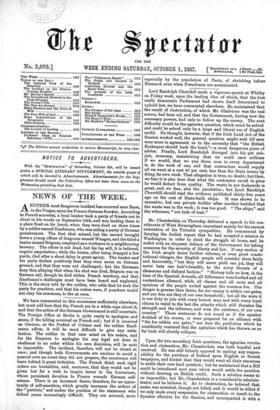Lord Randolph Churchill made a vigorous speech at Whitby on
Friday week, upon the leading idea of which, that the first really democratic Parliament had shown itself determined to uphold law, we have commented elsewhere. He maintained that the result of obstruction, of which Mr. Gladstone was the real source, had been nil, and that the Government, having now the neceesary powers, had only to follow up the enemy. The next difficulty would be the agrarian question, which must be solved and could be solved only by a large and liberal use of English credit. He thought, however, that if the Irish Land Act of the Session worked well, the general question might, wait till men were more in agreement as to the necessity that "the British Exchequer should back the bond,"—a most dangerous piece of advice. Finally, Lord Randolph diverged into his pet sub- ject, economy, maintaining that we could save millions if we would, that we pay three men in every department to do the work of one, and that contractors would supply all we want at a cost 40 per cent, less than the State incurs by doing its own work. That allegation is true, no doubt; but then, we fear it is also tame that what the contractor saved in price he would, deduct from quality. The waste in our dockyards is great, and, we fear, also the peculation ; but Lord Randolph Churchill should read the evidence published thirty-five years ago on the cost of State-built ships. It was shown to be excessive; but one private builder after another testified that the waste was in the work ; it was too good. "The ships," said the witnesses, "are beds of teak."


































